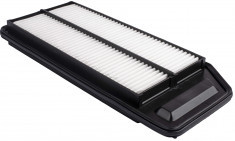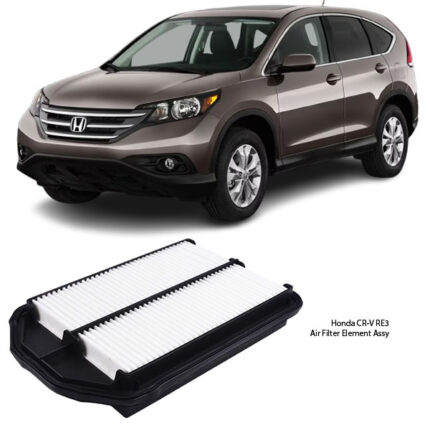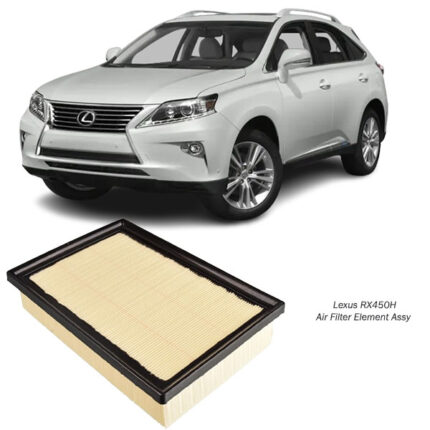Get Lexus RX450H Air Filter Element Assy A1541 in Kenya
The Air Filter Element Assembly is an essential component of a vehicle’s engine air intake system. It plays a crucial role in filtering dust, dirt, debris, and contaminants from entering the engine, ensuring clean air for efficient combustion. A high-quality air filter not only enhances engine performance but also improves fuel efficiency and prolongs engine life.
In this detailed guide, we’ll cover:
What an Air Filter Element Assembly is
How it works
Different types of air filters
Signs of a clogged or failing air filter
When and how to replace it
Best brands and maintenance tips
Let’s get started!
What is an Air Filter Element Assembly?
The Air Filter Element Assembly consists of the filter element enclosed in a housing or casing that directs clean air to the engine intake manifold. It is typically located in the air intake box or air filter housing, near the engine bay.
Main Functions of an Air Filter Element Assembly
Filters Contaminants: Blocks dust, pollen, dirt, and debris from entering the engine
Ensures Clean Airflow: Provides clean air for efficient fuel combustion
Improves Engine Performance: Prevents carbon buildup and enhances power output
Increases Fuel Efficiency: Reduces fuel consumption by optimizing the air-fuel mixture
Extends Engine Life: Prevents dirt from damaging internal components
A well-maintained air filter ensures smooth engine operation, improved acceleration, and better mileage.
How Does an Air Filter Element Assembly Work?
The air filter assembly functions as the first line of defense against harmful particles that can damage the engine.
Air Intake Process: The engine draws in outside air through the intake system
Filtration Process: The air passes through the filter element, which traps contaminants
Clean Airflow: The purified air then flows into the combustion chamber for fuel mixing
Optimized Combustion: Clean air ensures efficient fuel burning, improving power and mileage
Without a properly functioning air filter, contaminants can clog fuel injectors, reduce combustion efficiency, and cause engine damage.
Types of Air Filters
There are several types of air filters, each designed for different driving conditions and performance needs.
Paper Air Filters
Most common type
Made of pleated paper material to trap fine particles
Affordable and effective for regular driving
Requires periodic replacement
Foam Air Filters
Made of polyurethane foam
Used in off-road and high-dust environments
Can be cleaned and reused
Ideal for dirt bikes, ATVs, and heavy-duty vehicles
Cotton Gauze Air Filters
High-performance air filters (e.g., K&N filters)
Provides better airflow and filtration balance
Reusable and washable
Used in sports cars and modified vehicles
Carbon-Activated Air Filters
Contains activated carbon to remove harmful gases and odors
Used in luxury and high-end vehicles
Improves air quality inside the cabin
Performance Cold Air Intake Filters
Designed for increased airflow and horsepower gains
Used in racing and high-performance applications
Often requires a custom air intake system
The right air filter depends on your vehicle type, environment, and performance needs.
Signs Your Air Filter Needs Replacement
A dirty or clogged air filter can reduce engine efficiency and cause performance issues. Watch out for these warning signs:
Reduced Acceleration & Power: Dirty air filters restrict airflow, leading to sluggish performance
Decreased Fuel Efficiency: A clogged filter causes inefficient combustion, increasing fuel consumption
Check Engine Light (CEL) On: Poor air intake can trigger a warning light on your dashboard
Black Smoke from Exhaust: Incomplete combustion due to a dirty filter can lead to excessive smoke
Rough Idling & Misfires: Poor airflow disrupts the air-fuel mixture, causing misfires
Unusual Engine Sounds: A clogged filter can cause the engine to work harder, leading to strange noises
If you notice any of these symptoms, it’s time to inspect and replace your air filter.
When Should You Replace Your Air Filter?
Recommended Replacement Interval:
Every 15,000 – 30,000 km (10,000 – 20,000 miles) for normal driving condition
Every 10,000 – 15,000 km (6,000 – 10,000 miles) for dusty or off-road conditions
Factors Affecting Lifespan:
Driving Conditions: Dusty, polluted, or off-road environments shorten lifespan
Weather & Climate: Dry, sandy, or industrial areas require frequent changes
Engine Type & Performance: High-performance engines need cleaner air for optimal function
How to Replace an Air Filter Element Assembly?
Replacing an air filter is a quick and easy process that requires minimal tools.
Tools Needed:
Screwdriver (if required for the airbox)
New air filter element
Step-by-Step Process:
Locate the Air Filter Housing – Usually near the front of the engine bay
Remove the Airbox Cover – Open the cover using clips or screws
Take Out the Old Air Filter – Inspect it for dirt, dust, and damage
Clean the Airbox – Remove debris or dust buildup inside the housing
Install the New Air Filter – Ensure proper orientation for correct airflow
Reattach the Airbox Cover – Secure it tightly to prevent leaks
Start the Engine & Test Drive – Check for smooth operation and acceleration
Caution: Always use the correct filter size and type for your vehicle.
Maintenance Tips for Longer Air Filter Life
Check the Air Filter Regularly – Inspect it every 5,000 km (3,000 miles)
Clean Reusable Filters Properly – Follow manufacturer instructions
Avoid Driving in Extreme Dusty Conditions – If possible, use better filtration
Ensure Proper Sealing – A loose filter allows unfiltered air into the engine
A clean air filter ensures a healthy engine, better fuel economy, and optimal performance.
Follow us on Facebook for more parts.




